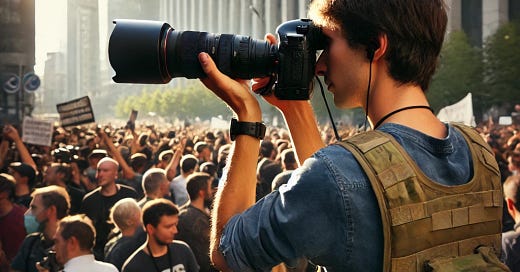Artificial Intelligence and the Threat to the Real: An Interview With Mutale Nkonde
Mutale Nkonde, CEO of AI for the People, speaks about algorithmic racism in the databases that drive large language models and how this bias shapes AI-generated images.

In the world of visual journalism, no change is more significant or happening faster than “artificial intelligence.”
AI has become a catch-all term for several related but distinct technologies. However, in its simplest form, it is—as Mutale Nkonde says—“a branch of computer science that uses machine learning to conduct what we would normally think about as high-level neurological functions.”
Ever since generative AI—especially text-to-image functions—became public about 18 months ago, attention and concern have intensified. GPTs' (that is, generative pre-trained transformer models) capacity to produce photorealistic images and video poses enormous risks for those of us concerned with the production of accurate, authentic, and verifiable images.
While the rise of generative AI poses many challenges, it also gives visual journalism, especially documentary photography and photojournalism, an opportunity to be better recognized for its contribution to reporting. For too long, visual journalism has not had a seat at the table where discussions about the future of journalism are taking place. The obvious risks of synthetic media have paradoxically created an opening for an understanding of the importance and necessity of trustworthy imagery.
Ever since photography was invented in the early 19th century, the boundary between the real and the unreal, the accurate and the inaccurate, has been contested. In the 21st century, faced with the challenges of AI, we can not propose the misplaced nostalgia of returning to a simpler time when (allegedly) everyone believed photos and videos. Instead, we have to think through what we want still and moving images to do and work to secure their integrity.
In this context, The VII Foundation is campaigning to raise awareness about the challenges, opportunities, and responses to technological change in visual journalism through research, writing, and debates.
This year, in April, we organized a panel at the International Journalism Festival in Perugia with our friends at Reporters Without Borders and the World Press Photo Foundation. We have previously hosted presentations by Fred Ritchin and Tomas van Houtryve on VII Insider. At the Rencontres d’Arles festival, we held a discussion with Santiago Lyon, Head of Advocacy and Education, Content Authenticity Initiative, Nicolas Jimenez, Director of Photography, Le Monde, and Mutale Nkonde, CEO of AI for the People, on artificial intelligence and the threat to the real. You can watch videos of these three events via the links provided.
Mutale Nkonde could not attend that panel in Arles on July 3, but her voice was part of the discussion via an edited interview I conducted with her prior to the event.
Given the importance of Mutale’s work on algorithmic bias and race in AI, we wanted to publish the full 24-minute interview with Mutale here on Dispatches.
Mutale is the CEO of AI for the People, which advocates for policies that reduce the expression of algorithmic bias, one of the greatest challenges facing AI. Mutale advised the US Congress in 2019 when AI for the People campaigned for the introduction of the Algorithmic Accountability Act. In 2023, she took part in one of Senator Schumer's AI Insight Panels. Then, in 2024, she was one of the civil society leaders helping the Congressional Black Caucus develop its AI Policy platform. She is also a visiting fellow at the Oxford Internet Institute and a Harding Distinguished Postgraduate Scholar at Cambridge University.
We hope you get as much insight from Mutale’s interview as we did.



